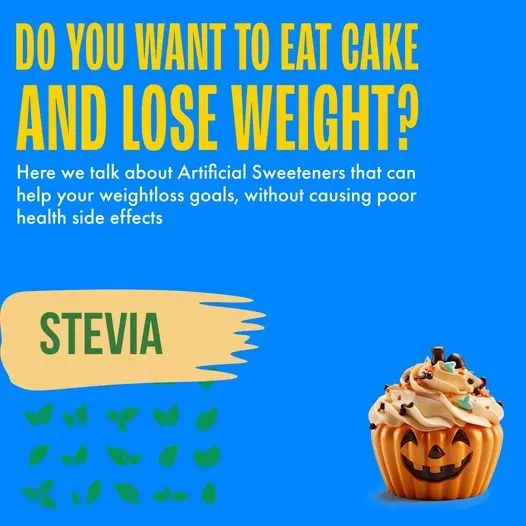The war on artificial sweeteners or Non-nutritive sweeteners (NNS)
We have things like sucralose, saccharin, acesulfame potassium, and aspartame for artificial sweeteners. For natural non-nutritive or low cal: Stevia, monkfruit, and sugar alcohols (xylitol, erythritol, etc).
*We’ll call these Natural sweeteners “NNS” for Non-nutritive sweeteners. This will be a concise post on the subject, so I will try to bring the most important facts to you, but it will not cover everything.
I don’t recommend any artificial sweeteners I listed above; I won’t cover those in those posts. I much prefer the NNSs.
Let us cover three areas of NNS:
1.) What are the best ones to use
2.) NNS and artificial sweeteners for gut health
3.) Do these sweeteners cause more cravings and cause people to eat more
What are the best ones to use
The best NNS is Stevia (not Truvia, since it’s mainly Erythritol and Extract).
Stevia could be beneficial for your health since it is shown to improve the oral microbiome and lower insulin. Stevia is not the only sweetener on the list that improves the oral microbiome, but it is one of the better ones on the list for sure; when we look at enhanced oral microbiome, you see a reduction in cavity Associated bacteria and a reduction in harmful bacteria growth.
NNS and artificial sweeteners for gut health
With all of these sweeteners, we see changes within the gut’s microbiome populations. Most of these changes have been deemed non-functional or neutral, but stevia is identified in many studies to have beneficial effects. We see improved insulin sensitivity, anti-cavity, lower oxidative stress, anti-hypertensive, and antitumor activities, which would leave me to believe that it benefits the gut.
Here’s a note for those who struggle with IBS and gut health: artificial sweeteners may not be your culprit. You’ve probably heard many IBS experts talk about the effects of artificial sweeteners and IBS prevention. Still, if you dig into the research, only some human studies look at artificial sweeteners, IBS, or other gut issues. There is, however, a plethora of cell culture and mouse data on intestinal permeability, IBS, etc., related to artificial sweeteners. So we don’t know how these artificial sweeteners or NNS directly affect the human system, but generally, base it on feel; if you notice any artificial sweetener, even Stevia, that causes upset stomach or bowel distress, don’t allow yourself to consume it.
Do these sweeteners cause more cravings and cause people to eat more
Talking from personal experience, I have gone many months without any additional sweeteners. I have gone through the other end of the spectrum, where I’ve sweetened almost everything utilizing all types of artificial and NNS sweeteners. I see little increase in cravings for natural sugary foods when I consume more NNS, And I generally can make more appetite-curbing meals that are sweetened with NNS. So, NNS is a tool that helps me cut weight and enjoy my diet no matter how many calories I eat.
A systematic review of over 13,000 pieces of data was collected from 56 studies, with about half being observational and the other half being RCTs. The study here demonstrates no increase in body fat and shows a decrease in those that had NNS sweeteners,
Here’s a quote from the study: the results are pretty straightforward: “When comparing non-nutritive sweeteners (NNS) vs sucrose, significant weight/BMI differences appeared favoring NNS. Consumption of NNS led to significantly reduced weight/BMI differences in unrestricted energy diets but not in calorie-controlled weight-reduction diets. Participants with obesity and adults showed significant favorable weight/BMI differences with NNS. Data suggest that replacing sugar with NNS leads to weight reduction, particularly in participants with overweight/obesity under an unrestricted diet.”
“… particularly in participants with overweight/obesity under an unrestricted diet.” – This is going to be the majority of Americans. Yet another data point for the favorable use of non-nutritive sweeteners.
In conclusion, you’re safe with just about any artificial sweetener on the market if you feel okay with it. Still, I recommend that you stick with NNS, which is listed, and I especially recommend Stevia as a sugar alternative. We are much better off using NNS as opposed to sugar. A good example would be drinking a Stevia-sweetened beverage versus traditionally enhanced pops or other sweet teas. I’ve seen increased triglycerides and body fat in individuals who consume traditional sugar or high fructose corn syrup-based products.
References
Allison Sylvetsky. Metabolic Effects of Low-Calorie Sweeteners: A Brief Review. The Obesity Society. Volume26, IssueS3. Special Issue: Low‐Calorie Sweeteners and Weight Management. October 2018. Pages S25-S31. https://doi.org/10.1002/oby.22252.
Jorge Carlos Ruiz-Ruiz, Yolanda Beatriz Moguel-Ordoñez & Maira Rubi Segura-Campos (2017) Biological activity of Stevia rebaudiana Bertoni and their relationship to health, Critical Reviews in Food Science and Nutrition, 57:12, 2680-2690, DOI: 10.1080/10408398.2015.1072083
Abigail Raffner Basson et al. Artificial Sweeteners: History and New Concepts on Inflammation. Front. Nutr., 24 September 2021 | https://doi.org/10.3389/fnut.2021.746247
Ruiz-Ojeda FJ, Plaza-Díaz J, Sáez-Lara MJ, Gil A. Effects of Sweeteners on the Gut Microbiota: A Review of Experimental Studies and Clinical Trials. Adv Nutr. 2019 Jan 1;10(suppl_1):S31-S48. doi: 10.1093/advances/nmy037. Erratum in: Adv Nutr. 2020 Mar 1;11(2):468. PMID: 30721958; PMCID: PMC6363527 .

